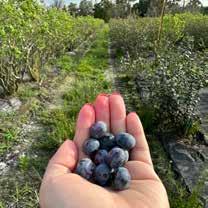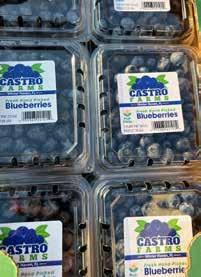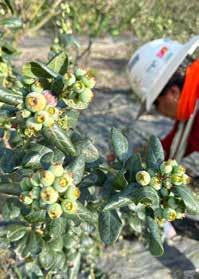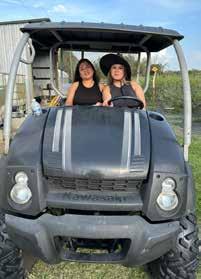
5 minute read
Red, White, and Blueberries
From Migrant Workers to Farm Owners: Castro Family Is Proof of the American Dream
by RYAN MILEJCZAK
Advertisement


HERMAN CASTRO has spent all his life working in agriculture. Born in Guatemala and raised in Mexico, he spent years working in sugarcane fields before coming to the United States. Over the years, he worked in orange and grapefruit groves in Florida, as well as in blueberry fields in New Jersey.
It was there in those blueberry fields that Herman first met his wife, Yolanda, originally from Veracruz, Mexico. One day, she joined his crew for a day in the blueberry field, and for Herman, it was love at first sight. Not long after, they were happily married.
The two spent years working picking fruit around the country, but the Castros weren’t satisfied with simply working the fields. They had a bigger dream.
One day, after hours of hard work, Herman sat on the sidewalk, exhausted. He knew he wanted more, and in that moment, he was inspired to pray. He asked for the one thing he wanted most in the world: a simple, 2-acre blueberry farm.
In 2021, the Castro family was finally able to make that dream a reality. They opened Castro Farms LLC, and started their first blueberry farm in Winter Haven. And although Herman only asked for 2 acres, he was able to secure 12 acres for the farm. Before long, business was booming.
Why blueberries?
Yolanda has a simple answer: “Because Herman has always had an obsession with blueberries.” This keen interest, coupled with his experience, put him in the perfect position to start the farm.


The couple love their life working the farm. Yolanda describes working on the farm as “pure freedom and pure air.”
“Working in the fields is wonderful,” she says. “You don’t feel stuck, you feel completely free.” In fact, in Yolanda’s own words, when it comes to time spent working on the farm, “we feel completely at home.”
Thanks to their success, the Castros have been able to open a second 5-acre farm in Bartow, and the business is continuing to grow. One of the many who’ve noticed the success of Castro Farms is Dr. Gerard Krewer, professor emeritus at University of Georgia who specializes in small fruit and blueberries.
“In all my years as a fruit specialist, grower, and consultant, I’ve never seen a migrant worker buy a farm. It’s unheard of,” Krewer says. He goes on to add, “Now they have the blueberry farm, [and] their dream has come true.”
So what’s the secret to their success? As they put it, “Unity is power, and our family works together as a single unit.” And indeed, Castro Farms is a family effort.
In addition to Yolanda and Herman, their children Lucero, Carmen, Cindy, and Herman Jr. also help out on the farm. While their children have all grown up, graduated college, and started careers of their own, they still find time for the family business.



Lucero Carrillo-Moctezuma, the eldest daughter, spends Monday through Friday working for the state in Public Safety. Then, every Friday after she leaves the office, she heads straight to the farm. There, she’s in charge of distribution and communicating with vendors to ensure every last blueberry gets sold.
“For us, it’s been an honor to make our dream a reality,” she says of her family’s success. “I feel so proud of my parents and everything they’ve done and continue doing for our family. My parents are an example for everyone. I admire them so much, and value all their efforts to give the best to me and my siblings.”
As Yolanda puts it, “The American Dream does exist.” Indeed, the Castros are proof that, with hard work, achieving the American Dream really is possible.
While the Castros have seen much success, this is only the beginning for them.
“People always ask me,” recounts Herman, “‘Why do you keep working so hard when you already have [so much success]?’ And I tell them, ‘because I want my family to triumph.’”
The Castros have big hopes for the future of their farm. Recently, they’ve added a u-pick section to their Winter Haven farm, and in the future, they hope to start packing their own fruit, as well as selling it at Publix.
Krewer sees a great deal of potential in u-pick programs like these. “There’s about 22 million people now in Florida, so there’s potential for u-pick sales,” he says, “There’s no reason we can’t have lots and lots of blueberry farms around these urban centers.”
The Castros have high hopes for the Florida blueberry industry.
“It’s going to be even better,” Herman says. Krewer agrees with this assessment. “I feel very optimistic about the Florida blueberry industry,” he says. “Despite being sort of pressured on both ends, early and late, we still have one of the best market windows in the country.” ag




